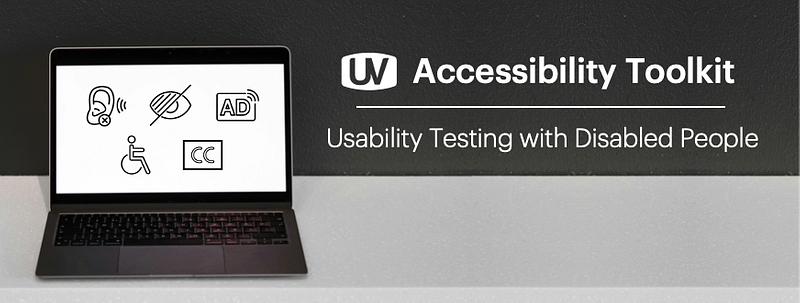Accessibility Toolkit - Usability Testing with Users with Disabilities
1 January 2025 - Chris Rourke

While conducting an accessibility audit can help identify and resolve technical issues, creating a truly inclusive experience requires understanding the lived experiences of disabled users. We regularly do this by conducting usability tests with disabled users to gather empirical evidence of the barriers they may encounter using websites and other digital platforms.
Even when using the same interface, users with different disabilities will encounter different types of issues depending on their specific disability and the assistive technology they use. For this reason, we always test with a representative selection of users with a variety of disability types, drawn from our own panel of participants with disabilities.
Why is testing with users important?
- Real-world feedback: Gain direct insights into the challenges disabled users face when interacting with digital products, including issues that may not be detected during audits, as accessibility guidelines can’t cover every unique scenario or interaction.
- Identify usability issues: Discover accessibility-related usability issues that automated tools or non-disabled testers might miss.
- Effective accessibility features: Based on feedback from actual users, ensure that accessibility features are effective and user-friendly for those who need them most.
- Promote inclusive design: Consider the diverse user needs from the outset, leading to better products for all users.
- Compliance and reputation: Comply with accessibility regulations more effectively, reducing legal risks and improving your reputation for inclusivity.
How can we help you?
We’ve worked with clients from various sectors to achieve positive outcomes based on insights from our user research with people with disabilities. Our consultants enjoy learning about people’s first-hand experiences and turning these insights into clear recommendations that will improve accessibility compliance and the experience for disabled users.
Usability testing with people with disabilities presents several additional challenges to those from standard usability testing. The assistive technology used, and the participant’s personal settings can affect the presentation and interaction with the site. To allow for this, our state-of-the-art research facilities support the use of a wide variety of assistive technologies. We can also perform both in-person and remotely moderated usability tests with disabled throughout the UK and internationally.
Our approach includes:
- Recruitment of diverse participants: Ensuring a representative sample of users with various disabilities.
- Task analysis and test preparation: Designing tasks that reflect real-world usage scenarios and journeys through the areas with potential accessibility risks.
- Moderated testing: Facilitating sessions where users provide real-time feedback.
- Expert results analysis: Our experienced consultants analyse the findings to identify improvement areas.
- Detailed deliverables and actionable recommendations: Offering clear, actionable recommendations to enhance accessibility and usability.
What next?
Are you ready to explore beyond accessibility audits and discover the real user experience for your site’s disabled customers? To learn more about how usability testing with users with disabilities can benefit your project, contact us to discuss your specific requirements.
You might also be interested in...
Why Your Usability Tests Are Failing: The Hidden Pitfalls That Mislead Teams
25 February 2026Many teams run usability tests that quietly mislead them—this article exposes the hidden pitfalls in planning, moderation and analysis, and explains how to fix them.
Read the article: Why Your Usability Tests Are Failing: The Hidden Pitfalls That Mislead TeamsUnderstanding Accessibility Drift - And How to Prevent It
12 February 2026Why accessibility standards erode after audits, and what continuous monitoring can do about it.
Read the article: Understanding Accessibility Drift - And How to Prevent ItAccessibility Toolkit - Access360 Managed Service
5 January 2026Continuous WCAG monitoring, expert audits, and capability building to maintain sustainable digital accessibility .
Read the article: Accessibility Toolkit - Access360 Managed Service